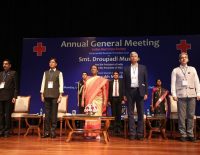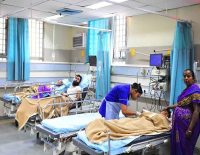AIIMS releases Neuro-trauma Home Care Advisory for head injury survivors

About 80 per cent of patients in India are discharged from home or referred to another hospital after initial recovery from head injuries or on tracheostomy support in Delhi’s AIIMS. Keeping in view that family members and caregivers face technical hurdles to manage these issues at home, the All India Institute of Medical Sciences, has released a multi linguistic Neuro-trauma Home Care Advisory in 12 regional languages for family members of head injury trauma survivors. Prof. Daljit Singh, President of Neurological Society of India, presented the first copy of the manual to the President of India Droupadi Murmu.
Traumatic brain injury (TBI) or head injury is one of the leading causes of morbidity and mortality in India. Approximately 50 per cent of trauma deaths are likely to be related to TUI, according to the Towards Improved Trauma Care Outcomes (IIICO) trauma registry of Indian urban university hospitals. It implies that about one TB1-related death occurs every 3 min. Nearly a million people are disabled owing to TBI in India each year.
Prof Deepak Gupta, JPN apex trauma center, AIIMS, who initiated this project on behalf of NSI society for Indian population, said, “We have been able to give world class care to our trauma patients achieving survival rates as good as in other parts, however, many survivors of head trauma do poorly once sent home due to lack of rehabilization centers”.
As per the report, helmet compliance is still very poor in Indian women. Falling from heights like balconies and windows is a very common mode of injury and are seen in over 60 per cent of cases among the children 1-5 yrs of age in India. We have also recently launched the Safe Balcony Safe Child campaign to prevent fall from height injuries in children under 5 years of age, said Prof Gupta, who is also Chairman of Brain Injury Initiatives of NSI.
The manual contains information (with pictorial assistance on step by step guide) on tracheostomy care, Ryles nube feeding, urinary catheter care, daily skin and pressure ulcer care, rehabilitation exercises, prevention of deep vein thrombosis (DVT), nutrition and medications care needed by these patients. Currently, it has been translated into all major 12 Indian languages – Hindi, Assamese, Bengali, Guajarati, Kannada, Malayalam, Marathi, Oriya, Punjabi, Tamil, Telugu and Urdu.








Comments